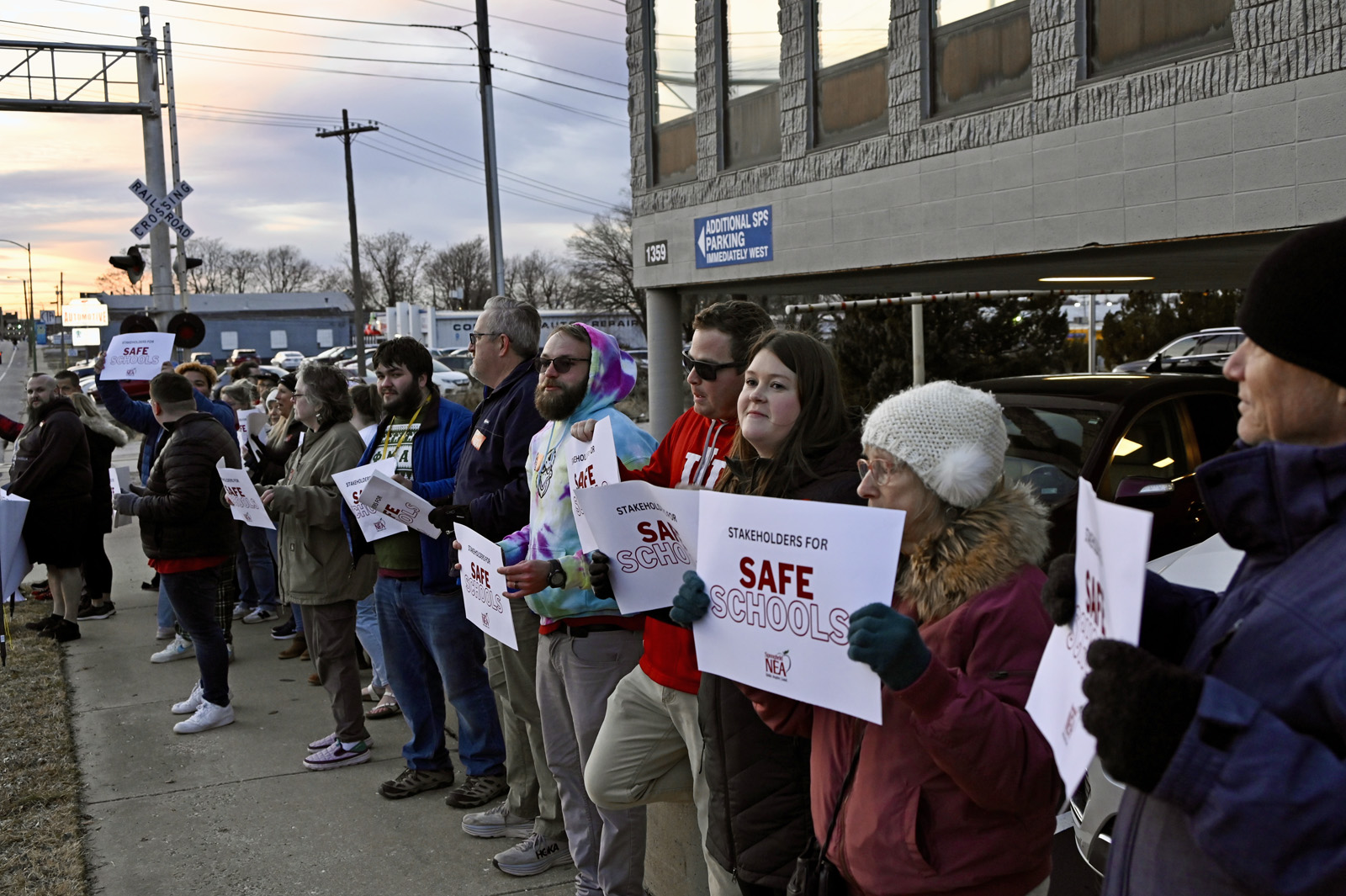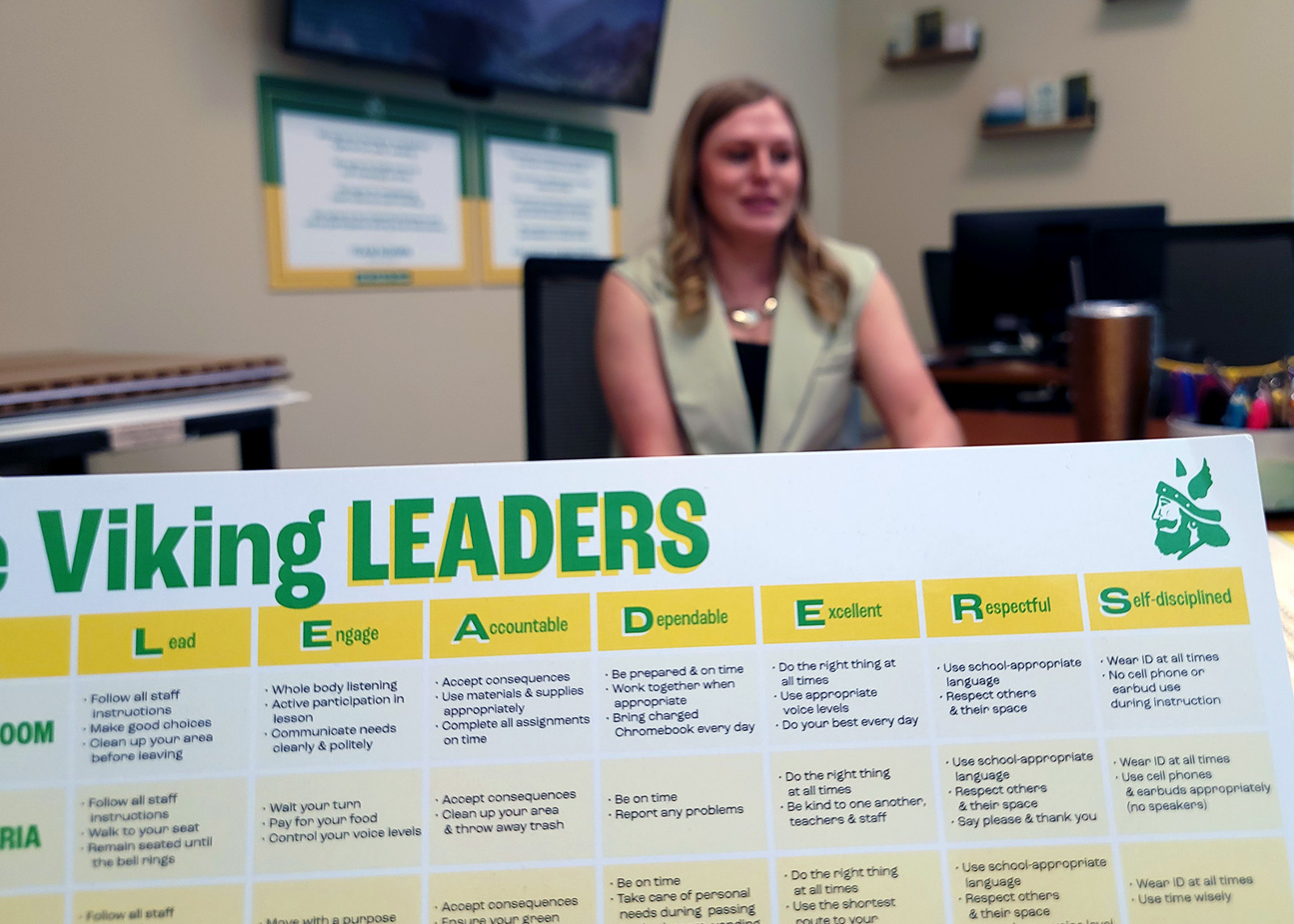IN-DEPTH
One semester into a transformational system to address student behavior, Springfield Public Schools officials said they are issuing more discipline referrals than ever before.
The head of the school district’s teachers union said they are not taking enough action to address bad behavior.
A discussion about teacher safety placed behavior in Springfield schools back in the spotlight in December. The Springfield chapter of the National Education Association (NEA) staged a protest outside SPS' headquarters before the Springfield Board of Education’s regular meeting. Protesters called for school administrators to better protect teachers and better enforce disciplinary policies.
Inside schools, the new behavioral framework is being put to the test with a rising number of disciplinary infractions.
Nicole Holt, deputy superintendent of academics for SPS, said schools are handling a larger number of disciplinary infractions in late 2023 than they were at this time last year. Whether it’s part of the COVID-19 comeback or for other societal factors, schools across the entire nation is seeing a similar uptick.
“We are encountering student behavior at a volume and frequency that we have not seen,” Holt said. “Regardless of why, it doesn’t matter because we in public education have an obligation to students, so we take them as they are. But they are coming to us with greater needs, both academically and behaviorally.”

Laura Mullins, president of Springfield NEA, said that what the district is doing isn’t enough, because it is putting teachers at risk. In November Mullins spoke about how teachers are seeing a number of infractions go unpunished, including repeated bullying and threats of physical harm. According to the NEA, students are flipping chairs, writing on walls, upending offices and classrooms and getting in teachers faces, pointing fingers in their faces and yelling at them.
“That speaks to what kind of situation we are in,” Mullins said. “If the referrals are up, and they are not letting teachers refer every time, but you’ll see that the majority of the consequences are a conference.”
New behavior framework implemented
Known by its acronym, Positive Behavioral Interventions and Strategies is a behavioral framework that encourages administrators to set expectations and reward successes in order to prevent bad behaviors. One of its main tactics is to think about redirections, not reprimands — instead of telling a student not to do something, they are instructed to instead do something in line with a code of conduct.
Springfield Public Schools put it in place as a result of a rash of bad behavior observed the previous school year. Superintendent Grenita Lathan last year outlined a 15-step process for getting behavior under control again. Those 15 steps were a result of hearing community feedback while SPS built its strategic plan.
After the board approved the behavior framework over the summer, SPS began the process of putting it in place at each school. Even before that, schools had started setting up focus rooms, where students could go to cool off as emotional issues developed.

One of the biggest changes happened at middle schools and high schools, where students reviewed behavior expectations and covered rules in the student handbook. Such attention to behavior was usually reserved for elementary students. Additionally, every parent or guardian was given the same handbook and asked to acknowledge its receipt.
This is part of the first of three tiers in PBIS — the first tier is a blanket that covers everyone, while tiers 2 and 3 are used for smaller groups of students or individuals.
Holt said punishments look different because the framework calls for a more proactive approach to behavior. Each school has a matrix of expectations and punishments that administrators can use as a guideline, and can be customized to meet their specific needs.
Teaching students about behaviors now looks a lot like teaching academics, Holt said.
“The greatest shift for our campuses has been with relationship to the proactive side of the house, and the intentionality with which we teach specific, expected behavoirs for students,” Holt said. “We’ve asked leaders and teachers on all of our campuses to think strategically about what is it that we need to teach kids up front. We have set up matrices so that those expected behaviors are taught systemically.”
Increased reports of bad behavior
At the beginning of the year, Holt told board members that jumps in numbers were coming, thanks to the new system. In October, Lathan confirmed that with a series of first-quarter stats that showed Springfield Public Schools are seeing more instances of bad behavior.
Across a three-year trend of first-quarter instances, numbers for this school year have outpaced the previous two. Categories trending up are disorderly conduct, defiance of authority and violent to school personnel or non-students. Students fighting are down.
The new system can be seen particularly in punishments. Parent conferences for this year have skyrocketed and detentions are up, while suspensions are down. First-quarter stats over the past three years:
- 1,827 conferences have been set this year, compared with 767 and 808 in the previous two years.
- 759 detentions have been assigned, compared with 158 and 58 in the previous two years.
- 1,518 in-school suspensions have been given, compared with 1,770 and 1,907 the previous two years.
- 978 out-of-school suspensions have been assigned, compared with 1,101 and 938 the previous two years.
Part of the reason for an increased number of conferences has been an adoption of conscious discipline, which is a tactic designed to ensure a student understands the ramification of a behavior so that punishment can be more effective.
The second quarter ended last week, after the Daily Citizen spoke with Springfield Public Schools officials.

Beth Engelhart, executive director of elementary learning for SPS, said that assigning a punishment isn’t formulaic, where a certain act draws a specific punishment.
“There are a lot of factors that leaders are considering when assigning discipline,” Engelhart said. “They are looking at the age, if there is a disability, the intentionality of the act and more. When a leader is making a decision about what consequence a student is going to have, a collaborative conversation is important.”
Engelhart said the new behavior system calls for at least monthly check-ins to review behaviors. Springfield Public Schools is also offering continued training on the system — earlier this month it hosted John Hannigan, a national expert who led a day-long session on the system’s intricacies and how to better utilize them.
Teachers tell union about issues
Mullins said she agrees with the choices of PBIS and conscious discipline. Her background as a teacher in Springfield, with experience at Doling, Sequiota and Pershing, helps her see the benefits it offers.
Based on what Mullins hears from teachers, the rollout of PBIS has left teachers in a bind. SPS has not yet invested enough to get better results from it, she said, and teachers are being asked to buy in without a lot of explanation.
“I like conscious discipline and PBIS, and I’ve seen them done really well at certain sites,” Mullins said. “But it is not going to be effective unless it is implemented properly with training staff and resources. You can’t just slap on that you are doing it, and expect it to solve your problems.”

Mullins said she speaks with teachers who have felt frustrated about egregious instances of bad behavior that went either unpunished, or with hardly any results. She said teachers are being asked to reduce the amount of referrals they write, classifying them as “major” or “minor.” Additionally, because behavior instances are on the rise, a system that seems to reduce discipline puts teachers more at risk.
Those member teachers contact her, Mullins said, because they feel like their complaints through the regular system do not get addressed. She said teachers say they are often left to buy their own stash of rewards for good behavior, and that sometimes those rewards are not the best way to reach certain students.
Rather than get rid of these new systems, Mullins said Springfield Public Schools needs to enforce its own code of conduct.
“I want them to process every infraction, as our code of conduct is built for,” Mullins said. “We have problems, we need to document them. We can't just be hiding them.”
SPS asks much of teachers
When asked, Holt said teachers are not being asked to reduce the number of referrals. Building administrators are ultimately responsible for the punishments that get decided, but there is no direction from the district administration to not issue referrals.
“If students are exhibiting behavior that violates our handbook, then the scope and sequence is to be applied,” Holt said. “Teachers have the autonomy to enter referrals at any point that they feel necessary.”
Because teachers are part of the discussion about behaviors and consequences, Holt said they are encouraged to talk to their building’s leader, and if a complaint goes unheard, the executive director of that building certainly wants to hear it.
Holt said that she knows Springfield expects a lot of its teachers, and that they are up to the task. She also knows the implementation of this new system has required teachers to think and act differently than they have in the past.
“We have hundreds and hundreds of amazing, hard-working, flexible teachers all over this district who answer the call every single day to serve our students where they are, and they are working harder than they have ever worked,” Holt said. “We are seeking feedback along the process of implementation, but one thing I know you don’t do is change course in the midst of plans and strategic implementation.”
Continued development expected
Lathan is expected to give more updates about stats about behavior to the Springfield Board of Education in the future. In December, school board members said they are interested in further conversation about student behavior and discipline programs.
Board member Kelly Byrne said he acknowledges Mullins’ previous statement about how bad behavior should come with consequences. Board member Judy Brunner said accountability can vary between circumstances and students, but it should never be absent.
As the system develops, growing pains are to be expected, said Stephen Hall, chief communications officer for SPS. In the end, the consistency it establishes should benefit students no matter where they attend school in Springfield.
“We have many students who transfer within our district and go from building to building,” Hall said. “While you want the expectations to be adaptable for each individual building, it’s the consistent framework that creates consistency for our students, their families and our staff members.”

